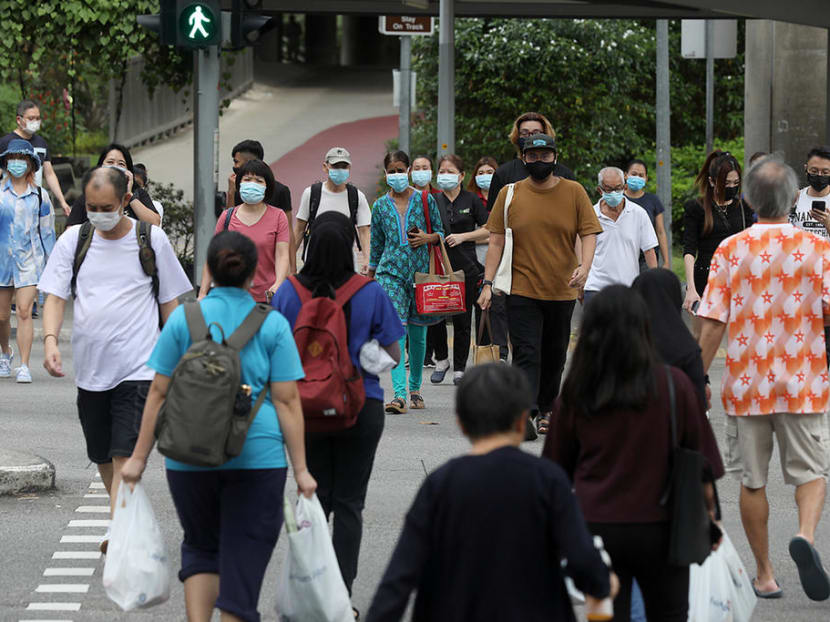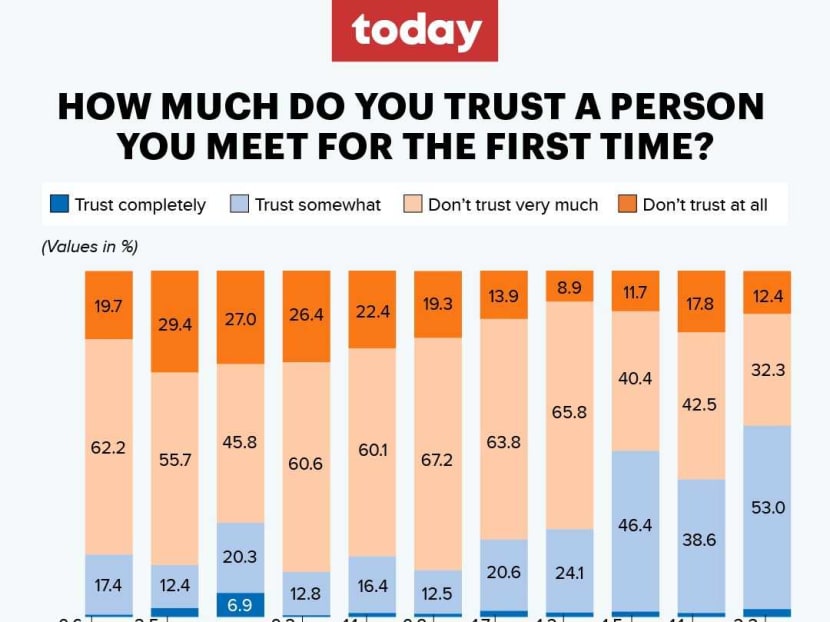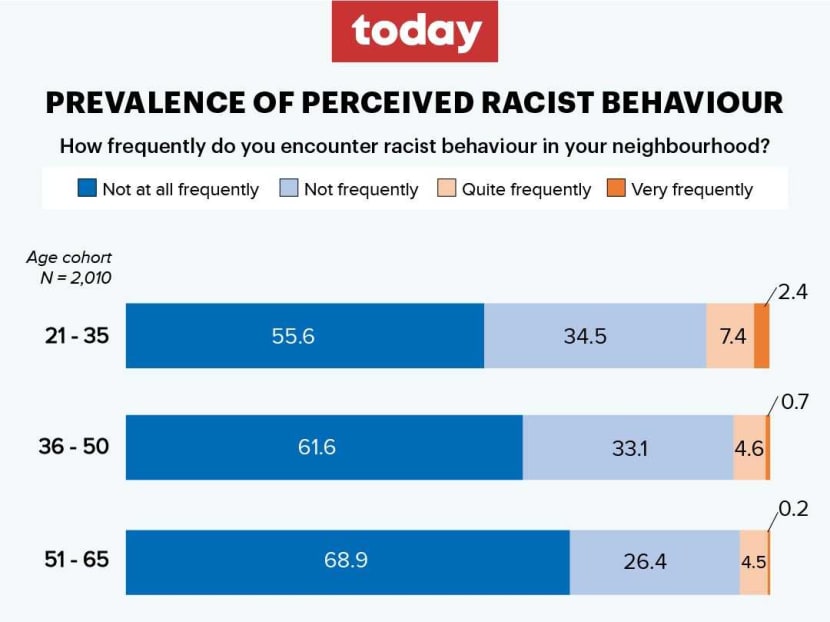Two-thirds of Singaporeans wary of trusting other people: IPS report
SINGAPORE — There is an overall low level of trust among Singaporeans for others, with two-thirds of respondents to a study saying that they felt they had to be very careful when dealing with people, as opposed to feeling most people could be trusted.

A global survey found that in Singapore, the younger, higher-educated and more affluent respondents were more likely to trust others.
- Researchers from IPS asked Singaporeans for their views on their lived experiences as part of a global survey
- The study found an overall low level of trust of other people among Singaporeans
- A quarter of respondents did not want neighbours who had Aids or were homosexuals
- Singaporeans felt that instances of racist and sexual harassment incidents here are low
- However, younger people felt they were more likely to encounter such incidents compared to older people
SINGAPORE — There is an overall low level of trust among Singaporeans for others, with two-thirds of respondents to a study saying that they felt they had to be very careful when dealing with people, as opposed to feeling most people could be trusted.
Outside close personal and family relationships, trust levels were not high, with most people not trusting very much those that they met for the first time.
The study, conducted by the Institute of Policy Studies and published on Friday (July 2), also looked at people’s perceptions of racist incidents and incidents of sexual harassment.
Overall, respondents found instances of such incidents to be low, although younger people tended to perceive that these happened more often.

Infographic: Samuel Woo/TODAY
The findings are part of the third and last instalment of the global World Values Survey, which takes in 80 countries and territories.
The first two reports, released earlier this year, examined Singaporeans’ values and their attitudes towards institutions, politics and policies.
The latest instalment of the report, titled Lived Experiences in Singapore, asked people here about their personal experiences and encounters.
It included responses from more than 2,000 Singaporeans in a nationally representative sample. Interviews were conducted face-to-face from November 2019 to March last year.
Singapore had previously taken part in the 2012 and 2002 iterations of the global survey.
WARY OF TRUSTING THOSE OUTSIDE OF FAMILY
Outside of family and personal relationships, trust levels did not appear to be high among Singaporeans, the authors of the report said.
Among Singapore respondents, 65.4 per cent indicated that they needed to be very careful of trusting people, similar to the proportion (62.5 per cent) from the last iteration of the survey in 2012
By contrast, in China, nearly two in three felt most people can be trusted
Close to 82 per cent of respondents said that they “did not trust very much” or “do not trust” strangers at all
The level of distrust was similar across Asian countries such as Japan, South Korea and Thailand
And respondents in societies such as Australia and the United States were split more evenly, with just under half saying that they did not trust strangers very much or at all
The survey found that younger, higher-educated and more affluent respondents were more likely to trust others.
At least one in three people aged 21 to 65 said that most people could be trusted
In comparison, only about one in four of those aged above 65 felt the same
While 26.5 per cent of those with secondary school or Institute of Technical Education (ITE) qualifications said that most people could be trusted, about 40 per cent of those with diploma or professional qualifications felt the same
Fewer than one-fifth of respondents who earned below S$1,500 a month said that most people could be trusted
On the other hand, just over half of those who earned above S$6,999 said the same
Younger and higher-educated respondents were more likely to trust people they met for the first time.
Slightly more than 20 per cent of those aged between 21 and 35 said that they trusted people somewhat upon first meeting them
In comparison, fewer than 20 per cent of those aged 36 and older felt the same
About 20 per cent of those with diploma or professional qualifications, as well as university degrees, said that they trusted people they met for the first time completely or somewhat
This percentage was lower than 15 per cent for those with ITE qualifications, secondary school education or lower
The study found that there was widespread support among respondents when it came to living next to people of different races, religions or language. However, some demographic groups were more averse to living next to people with Acquired Immunodeficiency Syndrome (Aids), homosexuals and cohabiting couples.
A quarter of respondents said that they would not like to have homosexuals or people with Aids as neighbours
Respondents who were older, had lower educational qualifications, earned lower income, lived in smaller housing types, and were Hindus or Muslims were more likely to mention that they did not want to live near homosexuals
Respondents who were female, older, with lower education or were interviewed after Covid-19 cases were reported in Singapore last February were more likely to be averse to living next to those with Aids
The researchers suggested that the pandemic could have accentuated fears of contracting illnesses, resulting in a higher reluctance to live near people with infectious diseases

Infographic: Samuel Woo/TODAY
ENCOUNTERING RACISM
Two-thirds of respondents felt that racist behaviour occurred “not at all frequently”. While this proportion is among the highest globally, it has declined substantially since 2012.
Only 5.7 per cent of Singapore respondents said that they encountered racist behaviour quite or very frequently. This figure was significantly lower than other countries such as Malaysia (28.4 per cent) and the United States (23.5 per cent)
However, while 79.2 per cent of respondents said in 2012 that racist incidents do not happen at all frequently, only 65.7 per cent said so in 2020
The study’s researchers said that this decrease could reflect a greater awareness among respondents of racism and what it constitutes
Younger, Indian and more-educated respondents were also more likely to indicate frequent incidents of racist behaviour in their neighbourhoods.
Close to 10 per cent of respondents aged 21 to 35 were more likely to indicate that this type of behaviour occurred quite or very frequently
This was about twice as much as those aged 36 to 50 and five times more than those aged above 65
Indians and those who fall under “others” in the racial group categories here reported the highest frequency of racist behaviour while Chinese respondents reported the lowest
13.8 per cent of Indians indicated that they encountered racism quite or very frequently
This was higher compared to those who fall under the “others” racial category (8.1 per cent), Malays (5.9 per cent) and Chinese (4.8 per cent)
More than 90 per cent of respondents felt that sexual harassment did not frequently occur at all or occurred infrequently.
Close to 96 per cent of Singapore respondents indicated that sexual harassment occurred “not frequently” or “not at all frequently”
This was the second-highest proportion out of nine countries and territories, topped by Taiwan (98.1 per cent of respondents)
However, younger and more-educated respondents were more likely to indicate that they had encountered sexual harassment.
For instance, those 7.1 per cent of those aged between 21 and 35 felt that they encountered sexual harassment quite or very frequently.
In comparison, 0.6 per cent of those aged above 65 felt the same
The researchers said that younger respondents are more likely to be the target of sexual harassment or are more aware of subtle forms of harassment











